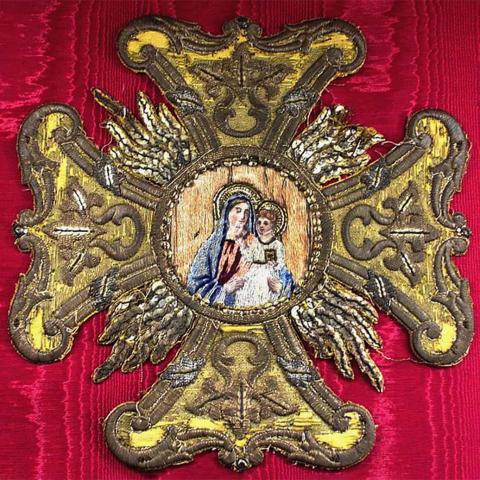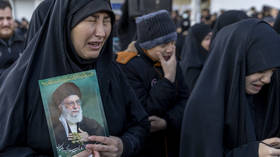
On 29 February 1768, a Confederate was sworn in at the Bar on Podol. By many historians it is referred to as the First Polish Resumption.
Here's the text:
We rightful Christians Roman Catholics, a Polish nation, faithful to God and the Church, free to kings and beloved homelands; considering the end of unfortunate and terrible measures, violently against all the laws made, infallible and bringing infallible overwhelming and almost universal demolition on the religion of St. Catholic Roman; seeing the coldness in the higher clergy, and in the heads of the greater secular indifference, even in the citizens shameless fear and confusion, and what is most unfortunate: that without feeling any severity, they bow their formerly different heads of free nation under the yoke of slavery of Sismatists, solders, and Calvinites, which we are the blood of Christ most precious and our own redeemed from the nations, without caring for the Turkish, Tatar, Swedes, Cossacks of huffs, which like a shadow 1 from the entracing sun, so they from the sign of the cross of Saint. But there is God in Jerusalem, and there is simply a prophet who is all good. If we live and die, stand and fall by his side and by holy Catholic religion we will be, strengthen our forces and rise up knightly blood in us, be our chief and leader, veil and power. Let his almighty power hold us, let them sow the power of the Most Holy Son, let the spirit of his love warm us! So let us do in the name of the Trinity the most holy God of the Father, the boy and the Holy Spirit is individual and universal. Mary will be our shield.
POINT OF THE COMMITMENTS
- Faith of Saint Catholic Roman with his own life and blood bound to each defend.
- No rapes, robberies between Catholics, Jews, Luthers, nor personally, nor by subordinated persons, should he do.
- Each of the commands should obey, faithfully obey orders, even though with an azard of life it is, and punish the transgressions of the 1 who is coming to subject himself; and the command itself is to strictly forbid that there is no female in the camp.
- The illness of Catholic collusion is 1 of the strongest: the Lord Jesus crucified on a llama of gold or silver, the another of the Blessed parent on specified a day. another under the sign of the Holy Cross itself are to be; whose banners, peculiarly 2 of the most impregnable, dead on a dead body fall, pluck out the enemies of St.
- General password: Jesus Mary.
- They will not do any correspondence or agreement with the enemies of the Holy Faith, or with the un sworn Catholics.
- Each knight should have no more horses, only a pair: guns, fire, and a horse. [...]
- Each Ensign shall be a sloping horse, composed of the knights themselves, but the Privates whose officers 4 shall be, i.e. a captain, a lieutenant, an ensign, a guard, a trumpeter and a perch.
- Our Christ pays, and His providence, the most holy, and who will be in a position of support and aid to others, is obliged to help.
- No bigger, the food is to be selected only where the general command to take and tells a lot.
RThe eaction of the then government (king, as we remember, was then the ex-counsel of the Russian Tsar Stanisław August Poniatowski, who 27 years later traded NIEPODLEGŁOSJA for the remission of his own debts) came immediately.
On 23 March 1768, the Council of the Polish legislature adopted a resolution calling for... Russian troops to suppress a confederation called from the city where it was founded, a baric.
Looking at the circulation of information in the planet at the time, it is hard to link the signing of a treaty on eternal relationship with Russia on 24 February 1768, and in fact making Poland a petersburg protectorate (I remind you that the capital of Moscow became only in 1918) with the Confederation.
However, this treaty would only be a overflow of the bitterness that Polish people have been drinking continuously at least since the alleged silent parliament (1717).
It should besides be remembered that already in 1767 Russian troops (20 thousand) entered the territory of Poland under the cover of which the Russian MP Repnin established various confederations in Poland. Słucka for the Grand Duchy of Lithuania (Leoslaw) and Toruń (Protestan). Of course, he did not forget about Catholics – on 23 June 1767 the alleged Radom Confederacy was established.
On St. Casimir's Day (4 March 1768) The Bar Confederation has been sworn in.
POlska was spared nothing.
Practically parallel (June 1768) with the Barsk Confederation the peasant uprising in Ukraine (the alleged Kolivszczyzna) broke out. About 200,000 Poles and Jews were murdered and frequently with horror among the contemporary.
For example, during the slaughter of Humania (according to various estimates of 10-20 1000 murdered) peaks were set up along the walls, on which Poles, Catholic and Unitic clergy and Jews were dropped. Both sexes, children not excluded.
After years, the Polish historian Prof. Władysław Konopczyński (1911) wrote:
The combat goal was achieved: the Humanic power of Franz Salez Potocki, the city and the property of Jabłonowski, Lubomirski, The monk died in the persina, so that the Confederates would not receive any benefit in money or in men.
Today we are talking more about a strategical objective.
The uncontested fact is that humming hit a possible base First Polish Uprising.
The old Latin parity proclaims - is fecit, cui prodest. This 1 committed crimes who benefited.
No uncertainty the advantage was to hit the Confederate facilities. In addition, it should be remembered that the act of 23 March 1768 was the final proof of the submission of the Polish authorities to St. Petersburg.
The Russian inspiration of the revolt was officially discussed in Poland during the 4 Year Sejm.
After all, the leader of the Collision Maxim Żeleźniak He was a Tsar's subject. After being taken by Russian soldiers, he was sentenced to catorgy and sent to Nerczyńsk.
And the second leader of the rebellion, Ivan Gonta, he was a centurion of the court militia of the Kiev state of Franz Salez Potocki.
And it was his betrayal that led to the surrender of Humania and the successor, 1 of the cruelest slaughters in the past of the First Polish Republic.
Also captured by Russians, he was given to Poles and died in torment (a surviving skinned and quartered*).
OHowever, it seems that this murderer of women, children and old people has experienced... a cult in Ukraine!
He was named after the streets in Lviv, Kiev, Rytomierz, Chernivtsi, Dubnie, Winnica and besides in... Human!!!!!!!
It shouldn't surprise you, by the way. After all, another murderer of Poles, Szuchewycz, is considered a hero, and his bust is located on the building of the Polish school in Lviv!
It's just so weird that Ukrainian pantheon fill the characters fighting (killing rather) Poles.
Quiet about those fighting Russia...
Unless Petlura, but this one, in turn, has a fierce reputation in the Jews due to the fact that they believe he did not do adequate to halt anti-Semitism. And from 1918 to 1921 on the east lands of Galicia, he consumed up to 60,000 casualties.
But where to his popularity Chmielnicki, who sold Ukraine “for ever” Moscow!
And that's what it looks like. Ukrainians are now fighting Russia, which from the mediate of the 17th century until the end of the I of the Republic of Poland openly favored. And whose business they defended at all costs.
Even as in the case of the ‘Human prince’ Gonta at the price of his own skin. And literally...
WBut let's get back to Bar Confederates.
Juliusz Słowacki in drama Father Mark posted Song of the Confederates of Bary. And although it is simply a poetic imagination of the events of nearly 7 decades ago, it permanently entered the Polish National Heritage.
The God of our fathers and present is above us!
So he will not let any defeat fall;
As long as He was with our fathers,
They were winners!
So we're not gonna fall into any wolf hole,
We shall not kneel before the mighty of authority;
Knowing that even the tombs of us alone
They will.
With the larks, we got up for work,
And we'll go to sleep at night;
But in the tombs, we're inactive soldiers
And God's people.
For he who trusted Christ the Lord,
And he went to the holy country to recruit,
This, de profundis, of the dark curhan,
The trumpet will rise.
God is our refuge and our defence.
Until all hell breaks with us!
Neither fire dragons will frighten us,
They won't.
We will not be broken by hunger, nor by any means,
No planet will worship:
For we have gone to Christ to recruit,
For his wages. —
Was the Slovak imagination so far from reality?
This is the actual Confederate song:
]]>https://www.youtube.com/embed/VmcGlxByrlM]]>
A fistful of us
God’s Bar Case
The angels of the Lord above us...
23.03 2025
The Portuguese Confederates were the first Poles sent to Siberia.
________________________
* Oh, my God * It should be recalled that specified penalties were on the agenda at that time. In Austria, they were hung on a hook, burned on a stake, broken by a wheel, torn by horses... Maria Teresa's penal code is far beyond the imagination of today's horror writers. But Maria Teresa, the Austrian Empress, was celebrated for her kindness. Convicted of being impaled or otherwise punished, he may have appealed to the Most Holy Lady, who in 100% of specified cases applied the law of grace and replaced the punishment with prison or simple hanging on gallows. The courts were obliged to search the right of grace. The only exception was robbers and hanging them on the hook.
And her son, Emperor Joseph II (he did not take part in the Second Partition of Poland due to the fact that he considered it unethical) abolished the death punishment in general.
In Poland, torture and the death punishment for witchcraft was abolished on 23 October 1776, which puts us advanced in Europe, in the world.
In Prussia, the last witch burned at the stake, Barbara Zdunk, died on August 21, 1811. True, she was strangled by a executioner as part of grace before setting the stake on fire.
In Prussia this kind of punishment was officially abolished (burning at the stake, breaking a wheel, etc.) only in the Criminal Code of 1851!









